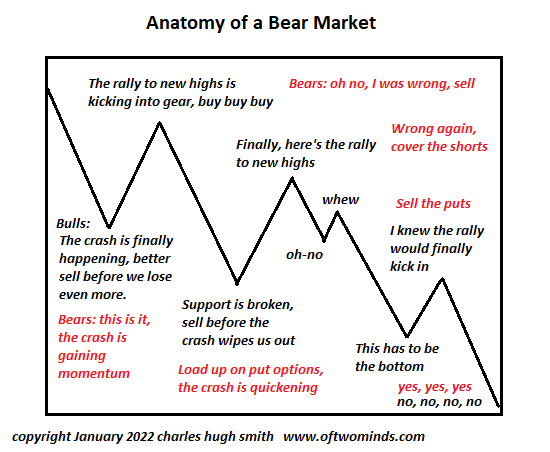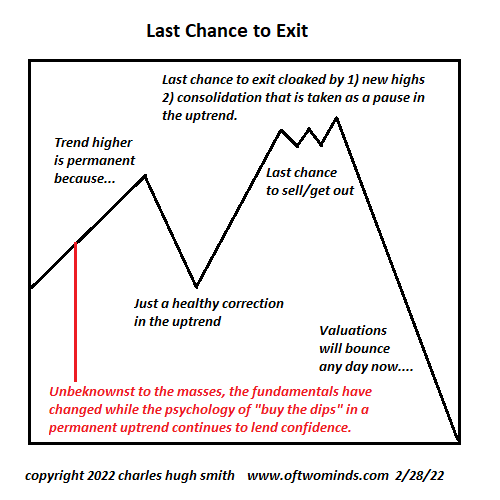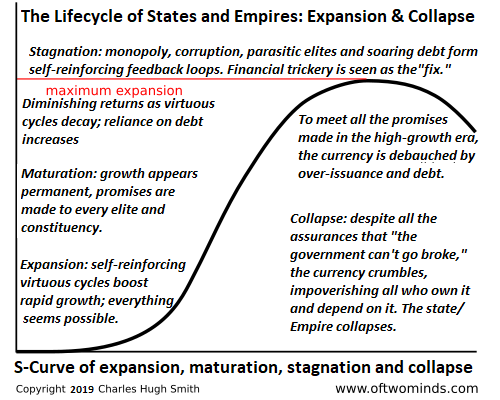Control What You Can
Our control is what's irreplaceable. Wealth, status and the illusory security of dependency chains cannot
replace control.
What's our personal strategy for navigating tumultuous times? I've long advocated controlling as much as you can. We don't control the availability of fuel and food from far away, or the government's policies. But that doesn't mean we're powerless to affect our destiny.
From the point of view of systems, the way to understand control is to examine each chain of dependency in our lives: how many links are there between you and the source of what you need?
The greater the number of links, the greater the vulnerability of the chain, as once one link is broken, the entire chain fails.
The ideal is complete control of the source of essentials: there is no dependency chain at all. This self-sufficiency is incomplete due to our dependencd on globalized industrial manufacturing, but reducing our needs to a bare minimum greatly reduces our dependency and increases our control.
In other words, the other measure of control is reducing how much we need. If we only need a small amount of money and essentials, then it's inherently easier to obtain a little rather than have to acquire a lot just to survive.
Consider fresh water as an analogy. The water flowing out of your tap comes from far away and requires an immense dependency chain of wells, reservoirs, pipes, pumps, filters, etc. all of which depends on 24/7 electrical power.
If we collect rainwater off our roof and filter / store it, the dependency chain is reduced to the weather providing rain.
If we reduce water consumption, that also reduces our dependence.
If water is cheap and easy to access, we waste it. If we have to carry all our water in buckets several hundred meters, we're much more careful about how the water is consumed. If we have to carry it a few kilometers, we're extremely careful.
How much we waste is completely within our control.
Shortening the dependency chain is at least partially within our control. If we walk to a true farmer's market (i.e. one in which the actual growers bring their produce to sell directly to consumers), this greatly reduces the number of links in the dependency chain compared to air freight from other continents.
If we grow some of our own food in our yard or a community garden, this eliminates the entire dependemcy chain (with the understanding that all food requires fresh water, compost and fertilizer).
We also control our exposure to toxic situations and people--situations and individuals who add corrosive, unproductive friction, waste and dysfunction to our lives. Reducing or eliminating our exposure to these energy sinks lightens the load on our energy and time and reduces our stress.
Chronic stress puts a strain on our physical and mental health, impairing our immune system and reducing the energy available to deal with pressing issues.
Reducing how much money and resources we need reduces our stress. Consider the difference between owning property in a high-property tax state and one with low property taxes as an example.
In a high-property state, one's property taxes might be $16,000 a year. (Been there and done that.) This requires someone earning $20,000 to 24,000 a year and paying taxes on that income to net the $16,000 required to pay property taxes.
$24,000 might not seem like a lot of money to high earners, but over time it adds up. Ten years of $16,000 a year and having to earn $24,000 (and pay $8,000 of that in federal and state income taxes) is startling: that's $160,000 in property taxes, $240,000 in earnings required to pay the property tax and $80,000 paid in income taxes on this $240,000.
Should the household income decline sharly in a recession, that $24,000 a year just to pay property taxes might become consequential.
If our property taxes are $1,600 a year, it requires much less labor and anxiety to pay the property tax.
If the state collects income and sales tax, the household that earns less and spends less pays a lower tax burden.
Many of these elements of control are subject to what I call a Devil's Pact: we make trade-offs which we think are beneficial but we have grossly undervalued what we've traded away and grossly overvalued what we're getting by sacrificing what is truly valuable.
In the classic Devil's Pact, the person trades their soul to the Devil in exchange for some earthly benefit. At first blush, the benefit seems extraordinarily valuable and the soul of little value.
We tolerate abusive situations where we've ceded power to sociopaths because the gains are so valuable. But we're trading our health and life for chimeras of status and security that can vanish overnight.
Only when the person is trapped and powerless do they recognize too late that they traded what was irreplaceable for a chimera of value.
Our control is what's irreplaceable. Wealth, status and the illusory security of dependency chains cannot
replace control.
This essay was first published as a weekly Musings Report sent exclusively to subscribers and
patrons at the $5/month ($54/year) and higher level. Thank you, patrons and subscribers, for
supporting my work and free website.



My new book is now available at a 10% discount this month:
Global Crisis, National Renewal: A (Revolutionary) Grand Strategy for the United States (Kindle $8.95, print $20)
If you found value in this content, please join me in seeking solutions by
becoming
a $1/month patron of my work via patreon.com.
Recent Videos/Podcasts:
Charles Hugh Smith on The Great Awakening Vision (Part II, 36 minutes, with Richard Bonugli)
Charles Hugh Smith on The Great Reset Agenda (Part I, 42 minutes, with Richard Bonugli)
My recent books:
Global Crisis, National Renewal: A (Revolutionary) Grand Strategy for the United States
(Kindle $9.95, print $25, audiobook)
Read Chapter One for free (PDF).
A Hacker's Teleology: Sharing the Wealth of Our Shrinking Planet
(Kindle $8.95, print $20,
audiobook $17.46)
Read the first section for free (PDF).
Will You Be Richer or Poorer?: Profit, Power, and AI in a Traumatized World
(Kindle $5, print $10, audiobook)
Read the first section for free (PDF).
Pathfinding our Destiny: Preventing the Final Fall of Our Democratic Republic
($5 Kindle, $10 print, (
audiobook):
Read the first section for free (PDF).
The Adventures of the Consulting Philosopher: The Disappearance of Drake
$1.29 Kindle, $8.95 print);
read the first chapters
for free (PDF)
Money and Work Unchained $6.95 Kindle, $15 print)
Read the first section for free
Become
a $1/month patron of my work via patreon.com.
NOTE: Contributions/subscriptions are acknowledged in the order received. Your name and email remain confidential and will not be given to any other individual, company or agency.
|
Thank you, Timothy K. ($10/month), for your outrageously generous pledge to this site -- I am greatly honored by your support and readership. |
Thank you, Thomas S. ($60), for your magnificently generous contribution to this site -- I am greatly honored by your support and readership. |
|
|
Thank you, Robert M. ($5/month), for your monstrously generous pledge to this site -- I am greatly honored by your support and readership. |
Thank you, Daniel M. ($5/month), for your marvelously generous pledge to this site -- I am greatly honored by your support and readership. |



























